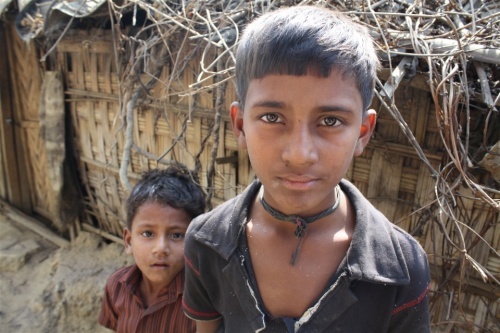
Human Rights in Myanmar/Burma are still uneven and particularly unsatisfactory for minorities. “The situation has not improved. We were hopeful during the 2010 election as we were given voting powers but now we are frustrated, ” Mostak Ahmad, an undocumented Rohingya refugee in Bangladesh who fled Myanmar/Burma 10 years ago, told IRIN. humanitarian news and analysis, a service of the UN Office for the Coordination of Humanitarian Affairs.
Political Prisoner Release Significant After Long Delay:
UNSG Ban Ki-moon commended Myanmar authorities on the long-awaited release of political prisoners today, (January 13, 2012, as well as other purported efforts being made to advance democracy and national reconciliation. In a statement, he characterized the release – reportedly of 651 prisoners in all, including a number of key, prominent figures – “the most significant release to date. The Secretary-General commends the Myanmar leadership for this important development and hopes that all those released will now be able to freely contribute to the process of national reconciliation, as well as to the strengthening of democracy and the rule of law within Myanmar.” Read: -“Myanmar Political Prisoners Health”-
diplomaticallyincorrect.org/films/blog_post/myanmar-political-prisoners-health-by-ambassador-mo/40817
Mr. Ban Took note of efforts presumably by the Myanmar authorities for renewed peace with the armed ethnic groups, including yesterday’s preliminary ceasefire between the authorities and the Karen National Union as well as the initial peace agreements with other groups. “He welcomes these efforts and encourages all concerned to build on recent progress and to work, through an all-inclusive dialogue, for an end to hostilities throughout the country, national reconciliation, stability and development for all the people of Myanmar.”
Clinton & Hague Visits Offer New Opportunity & Image?
However, we are suspicious that the Myanmar regime takes with one hand while denying with the other on issues of human and particularly minority rights. Engaging with the opposition after recent official visits by US Secretary of State Hillary Clinton and UK Foreign Secretary William Hague is part of the road to remove sanctions and restore diplomatic relations. A cease fire with the Karen minority also projects a positive image and of course may yield substantive results. However, other oppressed and stigmatized minorities as the Rohingya will continue to suffer the consequences of subtle and official discrimination akin to that endured by racial/ethnic minorities in governments moving to deflect opposition through chauventistic nationalism and/or ethnic politics.
The latest moves by the authorities of the South-east Asian nation are the continuation of reform efforts begun last year by President Thein Sein including an ongoing dialogue between the Government and pro-democracy leader Daw Aung San Suu Kyi have not touched the Rohingya, at least 200,000 now in Bangladesh and as many scattered regionally/globally after years of pogroms to evict them by Myanmar junta on ethnic/religious grounds.
Rohingya Not Encompassed by Purported Progress (From IRIN Report):
“Rohingya refugees in southern Bangladesh fear their condition may not change any time soon. They are skeptical about a string of reform moves by the Burmese government, saying they are not aware of any real improvement in the conditions which forced them to flee their country.
Since taking office in March 2011, President U Thein Sein, a former general, has released hundreds of political prisoners, legalized labour unions, eased censorship, held talks with Washington and London, and signed a ceasefire with ethnic Karen rebels - a major step towards ending one of the world's longest-running ethnic insurgencies. But for Rohingya, an ethnic group who fled to Bangladesh en masse from neighbouring Myanmar years earlier, there is little optimism.
Fazal Karim, 40, who fled to avoid forced labour, had recently spoken with his relatives in Myanmar.“ They said that in some cases the situation had worsened,” he said. Rohingyas - an ethnic, linguistic and religious (Muslim) minority who fled persecution decades ago - are caught between a rock and a hard place, activists say.“ Read More at -
www.irinnews.org/report.aspx?reportid=94639
---
Ethnic Chauvinism to Replace Repression of Political Opposition?
Hope for change in Myanmar cannot be viewed through perspective of only some of Burma’s people. It will be best measured by the treatment of minorities who frequently were subjected to both oppression and open disparagement on basis of ethnicity/religion. Read –“The Most Endangered Minority Group – ‘Ugly as Ogres’” -
diplomaticallyincorrect.org/films/blog_post/the-most-endangered-minority-group-ugly-as-ogres-by-ambassador-mo/27298
Also READ - “TREATMENT of MINORITIES in MYANMAR” -
diplomaticallyincorrect.org/films/blog_post/treatment-of-minorities-in-myanmar-runs-counter-to-promises-on-human-rights-democracy-by-ambassador-mo/28223
By Ambassador Muhamed Sacirbey
Facebook – Become a Fan at “Diplomatically Incorrect”
Twitter – Follow us – DiplomaticallyX
Related Reports at “War Crimes Justice Channel”
diplomaticallyincorrect.org/c/war-crimes-justice

